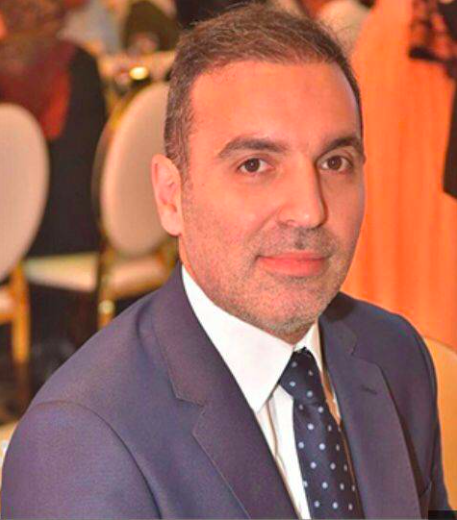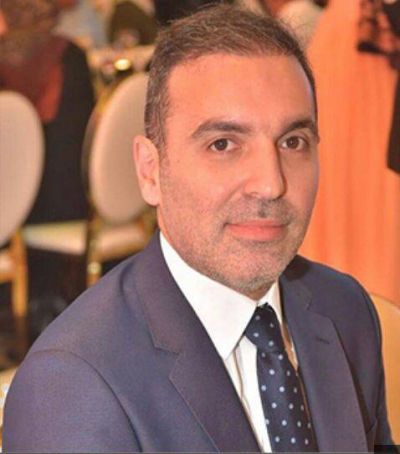
The head of the Beirut Indictment Chamber, Maher Cheaito.
On Thursday, the Beirut Indictment Chamber sent the Beirut Court of Appeals first Chief Judge Habib Rizkallah a request to recuse itself from the Riad Salameh case, following the action against the state targeting it, which former BDL governor filed on Tuesday before the plenary assembly of the Court of Cassation.
The indictment chamber intends to step down from the examination of the appeal, which the head of the committee of cases at the Justice Ministry, Judge Helena Iskandar, lodged on Aug. 2 against Beirut’s first investigating judge, Charbel Abou Samra, whom she has blamed for having kept Salameh free after questioning him on that day.
Legally, lodging an action against the state alleging “serious faults” by a court before the administration service of the plenary assembly immediately implies that the targeted court would discontinue its overseeing of the case.
This lawsuit is currently being misused in a number of cases, including the Beirut port explosion and other corruption cases, with the aim of obstructing the course of justice.
Why is this? Quite simply because the plenary assembly in question has been unable to meet due to a lack of quorum since March 2022. The assembly lost quorum after six of its 10 members retired. It does not seem that the appointment of their replacements will take place anytime soon due to political and sectarian disagreements over the judicial reshuffle.
The court seeks to step down from proceedings after being accused of facilitating the action against the state alleging “serious faults” on the part of the court, which the former Banque du Liban governor filed.
The Indictment chamber, which is chaired by Maher Cheaito and consists of Joseph Bousleiman and Christelle Melki, was under no obligation to recuse itself, since it shall relinquish jurisdiction once this action has been filed with the court’s administration service, as per the law.
However, the chamber expressly made this request with the aim of putting an end to the criticism, leveled by several parties, that it could have ruled on Judge Iskandar’s appeal on Tuesday before Salameh’s lawsuit was filed and subsequently dismissed.
Critics point to the fact that the court, which opened its hearing at 11 a.m., waited until 1 p.m. for Salameh’s lawyer to rectify a procedural error in order to validate his lawsuit. Critics therefore felt that the indictment chamber had deliberately wasted two hours waiting for Salameh’s lawyer to complete the procedures.
MP Georges Adwan, a lawyer and the vice-president of the Lebanese Forces’ executive committee, wrote that what happened during Tuesday’s hearing is “one of the biggest scandals the justice palace has ever seen.”
In the recusal request, which L’Orient-Le Jour read, the indictment chamber’s members expressed their “embarrassment” at the “nature” of Salameh’s action. “In the interests of ensuring the proper functioning of the course of justice, and in order to prevent the obstruction of investigations in the absence of a complete plenary assembly, we propose to step down from the case,” they said.
A source at the indictment chamber told L’Orient-Le Jour that the law allows the chamber to wait indefinitely for the plenary assembly to rule on the alleged “serious faults,” stressing that the chamber did not do so in order to give Judge Rizkallah the latitude to replace it with another chamber.
The indictment chamber, whose composition changes during judicial holidays, was composed on Aug. 2 of three other judges, namely Mireille Mallak, Fatima Majed and Mohammad Chehab, who had themselves accepted Judge Iskandar’s appeal and summoned Salameh, but without success.
Their successors, presided over by Judge Sami Soudki since Aug.9, in turn tried to notify Salameh of a hearing scheduled for Aug. 29, but they were only able to do so by posting a notice.
On the day of the hearing, Salameh, through his lawyer, targeted all the judges who had been on duty at the indictment chamber between Aug.2 and Aug. 29.
“Replacing Judges Cheaito, Bousleiman and Melki should not, however, reactivate the investigation into Salameh’s case,” said a senior judge.
According to our information, Salameh also intends to bring the same action against any indictment chamber that would be tasked with examining Judge Iskandar’s appeal.
According to the above-mentioned judge, the only way to ensure the smooth operation of justice in this area is to amend the current law that gives any litigant the power to halt proceedings that seem unfavorable to them at any time.
This is exactly what has happened in the proceedings relating to the Aug. 4 Beirut port explosion.
